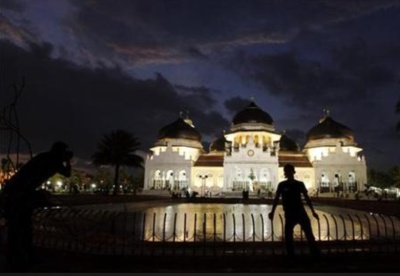300 Muslim leaders gather to denounce extremism and curb radicalism
Three hundred Muslim leaders from 33 countries gathered in Jakarta, Indonesia recently to denouce extremism and to find a way to curb radicalism.

"Muslim majority nations are now making statements globally and nationally to push back on extremism, and you will see more of it," Texas pastor Bob Roberts told Christianity Today. "This is sending signals to their citizens and the world that the tide is turning."
Nahdlatul Ulama, described as the largest Muslim organization in the world with somewhere between 30 million and 50 million members, hosted the conference. Called "International Summit of Moderate Islamic Leaders," it was attended by representatives of Egypt, Iran, Saudi Arabia, Syria, and Turkey, and others, who signed the Jakarta Statement, which, according to The Huffington Post, calls for a coalition of governments and religious groups in order to stop the religious support for terrorism and extremism.
One of the points that was emphasized during the summit is the misinterpretation of the idea of jihad by radical youth.
"That's why the role of Islamic clerics is needed to do more to correct the misinterpretation," said Indonesian Vice President Jusuf Kalla. "We gather here today for that purpose, to produce the solution to curb radicalism in the form of terrorism, wars and conflicts."
Indonesia's population is comprised of around 87.2 percent Muslim, 7 percent Christian, 2.9 percent are Roman Catholic, and the remainder includes Hindu, Buddhist, Confucian and unspecified, according the CIA World Factbook. The officially secular country has seen its people of different religious backgrounds living quite peacefully alongside each other.
"We don't want to dictate to the world, but we want to inspire [other countries by showing that] our concept of Islam could maintain peace and harmony within the diversity of Indonesia," NU chairman Said Aqil Siradj said.
Roberts, according to Christianity Today, believes that this is a sign of what is yet to come. He was present at an earlier conference, held in January in Morocco, where a gathering of Muslim scholars, heads of state, and religious leaders called for predominantly Muslim countries to protect the rights to freedom of Christians and other religious minorities. It was where they released a document titled "The Marrakesh Declaration."
"We hereby ... Call upon the various religious groups bound by the same national fabric to address their mutual state of selective amnesia that blocks memories of centuries of joint and shared living on the same land; we call upon them to rebuild the past by reviving this tradition of conviviality, and restoring our shared trust that has been eroded by extremists using acts of terror and aggression," the declaration reads in part, and they "AFFIRM that it is unconscionable to employ religion for the purpose of aggressing upon the rights of religious minorities in Muslim countries."
 Christians don't have to affirm transgenderism, but they can’t express that view at work: tribunal
Christians don't have to affirm transgenderism, but they can’t express that view at work: tribunal Archaeology discovery: Medieval Christian prayer beads found on Holy Island
Archaeology discovery: Medieval Christian prayer beads found on Holy Island Presbyterian Church in America votes to leave National Association of Evangelicals
Presbyterian Church in America votes to leave National Association of Evangelicals Over 50 killed in 'vile and satanic' attack at Nigerian church on Pentecost Sunday
Over 50 killed in 'vile and satanic' attack at Nigerian church on Pentecost Sunday Ukrainian Orthodox Church severs ties with Moscow over Patriarch Kirill's support for Putin's war
Ukrainian Orthodox Church severs ties with Moscow over Patriarch Kirill's support for Putin's war Islamic State kills 20 Nigerian Christians as revenge for US airstrike
Islamic State kills 20 Nigerian Christians as revenge for US airstrike Man who served 33 years in prison for murder leads inmates to Christ
Man who served 33 years in prison for murder leads inmates to Christ


 Nigerian student beaten to death, body burned over ‘blasphemous’ WhatsApp message
Nigerian student beaten to death, body burned over ‘blasphemous’ WhatsApp message 'A new low': World reacts after Hong Kong arrests 90-year-old Cardinal Joseph Zen
'A new low': World reacts after Hong Kong arrests 90-year-old Cardinal Joseph Zen Iran sentences Christian man to 10 years in prison for hosting house church worship gathering
Iran sentences Christian man to 10 years in prison for hosting house church worship gathering French Guyana: Pastor shot dead, church set on fire after meeting delegation of Evangelicals
French Guyana: Pastor shot dead, church set on fire after meeting delegation of Evangelicals ‘Talking Jesus’ report finds only 6% of UK adults identify as practicing Christians
‘Talking Jesus’ report finds only 6% of UK adults identify as practicing Christians Mission Eurasia ministry center blown up in Ukraine, hundreds of Bibles destroyed: 'God will provide'
Mission Eurasia ministry center blown up in Ukraine, hundreds of Bibles destroyed: 'God will provide' Church holds service for first time after ISIS desecrated it 8 years ago
Church holds service for first time after ISIS desecrated it 8 years ago Burger King apologizes for 'offensive campaign' using Jesus' words at the Last Supper
Burger King apologizes for 'offensive campaign' using Jesus' words at the Last Supper Uganda: Muslims abduct teacher, burn him inside mosque for praying in Christ’s name
Uganda: Muslims abduct teacher, burn him inside mosque for praying in Christ’s name